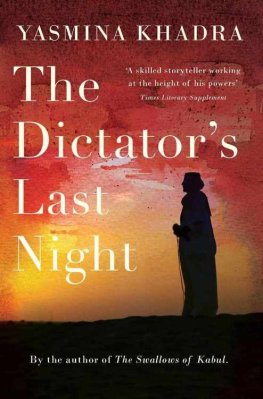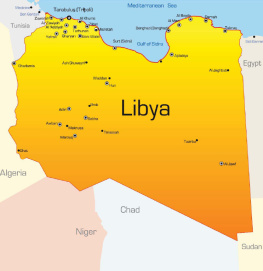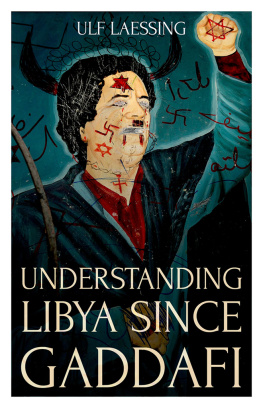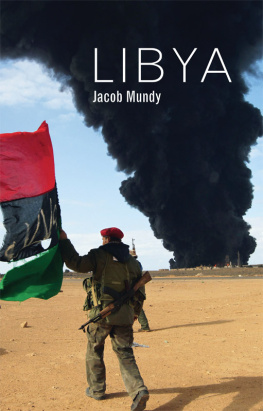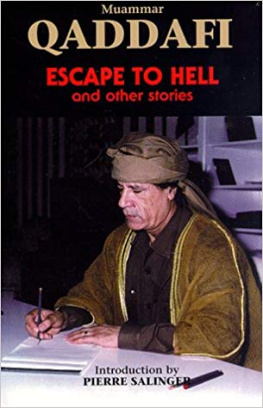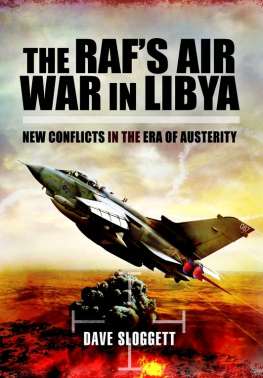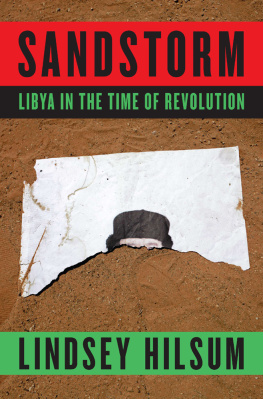To my uncle Jurek Krysiak, who worked in Libya for many years and inspired my interest in the country. He died while I was writing this book.
Libya is the land, more than any, where the forces which have shaped the modern world collide.
An orphan child of Empire, shaped by the colonial legacy of Italian rule, a testbed for Marxist thought, a vanguard nation in the struggle against the West and a nursery for Islamic radicalism, it was a state sponsor of terror and a pariah power. But Libya is also an oil producer fuelling contemporary capitalism, a crossroads nation which champions both Arab and African interests, a society in which women play a much more prominent role than in other developing nations, and a pragmatic ally of the West in combating al-Qaeda.
And the complexities of Libyas position go further still. While it has abandoned its pursuit of weapons of mass destruction, it supports the genocidal regimes of Sudan and Zimbabwe; while it seeks to combat Islamist terrorism, its role in the Lockerbie bombing is a crime for which no proper reckoning has been made; and while it seeks to live with the realities of modern liberal economics, it also persists as a brutal tyranny which operates by the rules of clan loyalty rather than attempting to move towards anything resembling democracy.
The man at the heart of all these contradictions is Libyas enigmatic ruler the great survivor of Arab nationalism, Muammar Gaddafi. Seeking the truth about Gaddafi is, like following tracks in the shifting sands of the Sahara, no easy task. But my colleague Daniel Kawczynski has brought his characteristic tenacity, passion and energy to the task. The result is a fascinating portrait of a land and its leader, with illuminating detail on every page and telling insights culled from Daniels own work on international development and human rights.
Daniels picture of Libya, for all that lands complexities and contradictions, does reinforce one overarching lesson. While Libya has been blessed with fabulous material and mineral wealth, the absence of democracy has held the country, its people and its neighbours back for decades now. Across the Arab world, millions live under tyrannies and autocracies, denied the opportunity to speak, think, work and love freely. Their talents are given no proper outlet, their voices are stifled, their futures blighted.
I know how passionately Daniel feels about the need to extend the hand of friendship to all those Arab peoples who have suffered so much under rulers indifferent to freedom and hostile to democracy in the last sixty years. And this book is testament to his love for Libya and its people, a land which has been blessed and cursed in equal measure over the last six decades but which has in Daniel a staunch and sincere friend.
Michael Gove MP
January 2010
April 1984 was an ugly month of violence in both Britain and Libya. In Tripoli, on the fifteenth, Libyan citizens watched in horror as that most barbaric of human ceremonies was enacted before them: a public hanging. The victims were two young undergraduates at Tripoli University. The reasons for their deaths were murky and poorly understood but certainly connected to the escalating paranoia of a leader determined to stamp out all opposition. It was neither the first nor the last state murder Gaddafi would present as a warning to his subjects, but its ramifications were to be profound.
Even in those pre-internet days, news of these students deaths quickly reached Libyan expatriates all over the world. In London, members of a dissident group called the National Front for the Salvation of Libya decided to mount a public protest against the hangings outside Libyas embassy, which, in accordance with the dictates of revolutionary correctness, had recently been renamed the London peoples bureau. Inside, the revolutionary zealots of highly uncertain diplomatic credentials who had seized control of the bureau earlier that year made their own plans for handling this unwelcome display of dissent.
On the morning of 17 April, the dissident demonstration went ahead in the normally staid and respectable surroundings of St Jamess Square. The protestors were angry but peaceful, chanting slogans and waving banners. This was to be no normal demonstration, however: at 10.20 a.m., participants and passers-by witnessed flames bursting from the first floor of the peoples bureau, and heard the drumming of a ten-second volley of machine-gun fire. Eleven of the anti-Gaddafi protestors, the intended targets, were injured.
The only fatality was a young British woman. Twenty-five-year-old Constable Yvonne Fletcher had been deployed that day alongside her fianc to police the protest, and tragically ended up an unintended victim of the cowardly Libyan agents, whose real intention had been to silence their unarmed, peacefully protesting compatriots. Fletchers helmet, left behind as she was rushed off in an ambulance, rested on the pavement for days, a potent symbol of the atrocity that was flashed on news broadcasts around the world. I was only twelve years old when Fletcher died, but as for many British people, the sight of her helmet lying in the no-mans land between the police lines and the Libyan peoples bureau was burnt in my memory. Even a small boy could recognise the potential for chaos and fear inherent in this bizarre murder of a serving police officer.
PC Fletchers murder marked the beginning of a steep slide in BritishLibyan relations: diplomatic representation was withdrawn on both sides; two years later Margaret Thatcher supported a belligerent President Reagan in his decision to bomb Tripoli; the IRA benefited more and more from Libyan money and Libyan explosives; and in 1988 Pan Am Flight 103 exploded over the skies of Lockerbie, perhaps the worst yet of the atrocities to be attributed to the Gaddafi regime.
Fast-forward to twenty years after the murder of PC Fletcher, and we see an entirely different scene. A characteristically dapper but increasingly frayed-at-the-edges Tony Blair is meeting a triumphant Colonel Gaddafi in his preferred theatre: a Bedouin tent set up in the Libyan desert. Relations with the Arab world in general are in tatters following an invasion of Iraq justified by a set of weapons of mass destruction (WMD) that are starting to seem a figment of the Western political imagination. Libya, at this point, has presented itself as a rare diplomatic victory for Blair. The two leaders shake hands as cameras flash, having discussed oil deals, the case of PC Fletcher, the atrocity over Lockerbie and WMD. The handshake marks what is seen by many as a triumph of courageous British diplomacy, the reintroduction of a cowed, co-operative Gaddafi into international politics. A dictator, presiding over an extensive and secret weapons programme, with allegedly high-quality intelligence on al-Qaeda, has been brought meekly into the fold, and British businesses stand to profit most handsomely. There are those crying foul, saying that the bloodstained Libyan record has been washed clean by rivers of oil. They take the desert handshake as further evidence of Blairs descent into ethical oblivion. But the fact remains that Gaddafi has reinvented himself yet again, and a new era in BritishLibyan relations has commenced.
Ours is an age in which the West has dealt closely and sometimes violently with regimes it has understood only poorly. We do not grapple enough with what the Arab societies we engage with, in whatever way, are really like. I wanted to write this book to dig deep into the realities of Libya and of Colonel Gaddafi, and to present some of the really difficult dilemmas of our relationship with the Libyans. After all, buried in our relationship with Libya are most of the problems that the modern Foreign Office faces. While journalists so readily and so graphically talk of oil versus blood, they are less ready to confront the really unpleasant truth that we need to get oil from somewhere, and few of those marketing it are easy-going democracies. Business contracts are decried as a foul and lowly consideration to take into a meeting with a dictator, but if we decided that we were only going to do business with the democrats of the world, British profits would be dented rather dramatically. Isolating the dictators of the world is often counterproductive, and by exchanging ideas, technology, visits and cultural insights, an argument goes that we can help to encourage change for the better.


